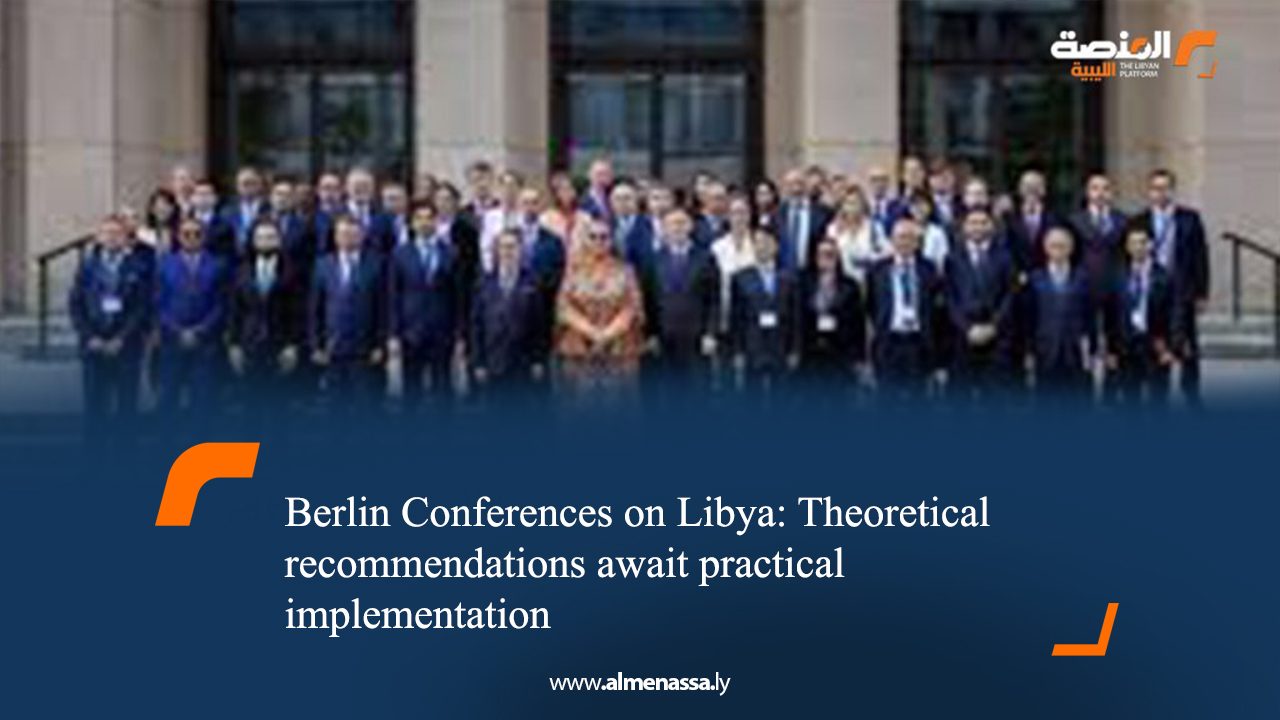In a recurring pattern, the international community has cast another stone into the stagnant waters of the Libyan political scene. Nations and regional organisations concerned with Libya convened in Berlin over two days, producing recommendations that can be seen as the third instalment in the series of Berlin Conferences on Libya. The question remains, however, as to how these theoretical recommendations will be translated into practical action on the ground.
Berlin I (January 2020): Foundations of a political solution:
Despite the importance of the outcomes of Berlin III, they did not deviate from the framework established by Berlin I and II. Berlin I, held in January 2020, affirmed that there is no military solution to the conflict in Libya and emphasised the need to respect the arms embargo imposed by the United Nations in 2011 on Libya. Key nations involved in the conflict then pledged to respect the embargo and refrain from interfering in Libya’s internal affairs, aiming to restore peace and stability.
Berlin II (June 2021): Withdrawal and unification:
Berlin II, held on Libya in June 2021, stressed the immediate withdrawal of foreign mercenaries and forces from Libya, and called for a reciprocal, coordinated, and balanced withdrawal of other foreign forces. It also urged the rapid disbandment and disarmament of armed groups and militias, the imposition of UN sanctions against those who violate the arms embargo or ceasefire, and the establishment of unified Libyan security and defence forces under a single civilian authority.
Berlin III (Last Friday): Renewed commitments and affirmation of sovereignty:
Regarding Berlin III, which concluded its work last Friday in its first meeting since October 2021 in its general format as the International Follow-up Committee on Libya (established according to the resolutions of Berlin I and II), participants renewed their firm commitment to the UN-facilitated political process in Libya and affirmed their absolute respect for relevant Security Council resolutions.
During their meeting in Berlin, co-chaired by the UN envoy to Libya, Hanna Tetteh, and the German Special Envoy to Libya, Ambassador Christian Back, participants reiterated their full respect and complete commitment to Libya’s sovereignty, independence, territorial integrity, and national unity, reaffirming once again their determination to continue supporting Libya and its people. They also reaffirmed their commitment to refraining from interfering in Libya’s internal affairs and urged all international actors to follow suit.
Stagnation in ceasefire implementation and increasing risks:
Participants from 20 countries and regional organisations expressed regret that while the 2020 ceasefire agreement remains in place, it has not yet been fully implemented, and initial progress towards a comprehensive political solution to the Libyan crisis has stalled. This poses increasing risks to Libya’s stability and unity, due to the crisis of legitimacy of existing Libyan institutions, fragmented governance structures, and the rapidly deteriorating economic and financial situation facing the country.
Reconciliation efforts and the role of the Advisory Committee:
Participants commended the efforts of Libyan parties aimed at achieving comprehensive national reconciliation and acknowledged the constructive role played by the African Union in this regard. The UN mission expressed its eagerness to work in close coordination with member states on any supportive initiative, as well as with active regional organisations.
Participants also recognised the meticulous work undertaken by the Advisory Committee in identifying practical and realistic pathways to address critical contentious issues that continue to impede tangible progress in the political process. They praised the United Nations Support Mission in Libya (UNSMIL) for facilitating the committee’s work and engaging the broader public, alongside political and security actors, to build national consensus and broad support for moving forward towards sustainable solutions.
Necessity of international coordination and UN mission transparency:
Participants agreed on the necessity of renewed international coordination to support the mission’s efforts, based on the outcomes of the Advisory Committee. They also called on all parties to refrain from taking unilateral actions that would deepen existing divisions, reminding that those who obstruct the political process will be held accountable, including under relevant Security Council resolutions, which entail imposing sanctions.
UNSMIL briefed participants on its active engagement with the broader public, as well as political and security actors, intending to build consensus and broad support for a clear and consensual roadmap towards elections and unified institutions. This roadmap is based on an agreed legal framework within a clear timeline and tangible implementation phases.
Participants reiterated their commitment to holding regular meetings in the plenary format of the International Follow-up Committee on Libya, to guide international support for the UN-facilitated political process. They noted that Libya was added to this format in 2021 to strengthen the partnership. Participants also agreed to seek a more effective and coordinated role for the four main working groups (political, economic, security, human rights and international humanitarian law), and to discuss ways to move forward more effectively.
The biggest challenge: from theory to practical implementation:
Despite the significant importance of international conferences on Libya, the outcomes of these meetings desperately need a clear and detailed plan for their implementation in close cooperation with local political and military actors. Without such a plan, these conferences will remain confined to closed halls, and their recommendations will not transition to practical application on the ground, leaving the Libyan scene in a state of continuous deadlock.


